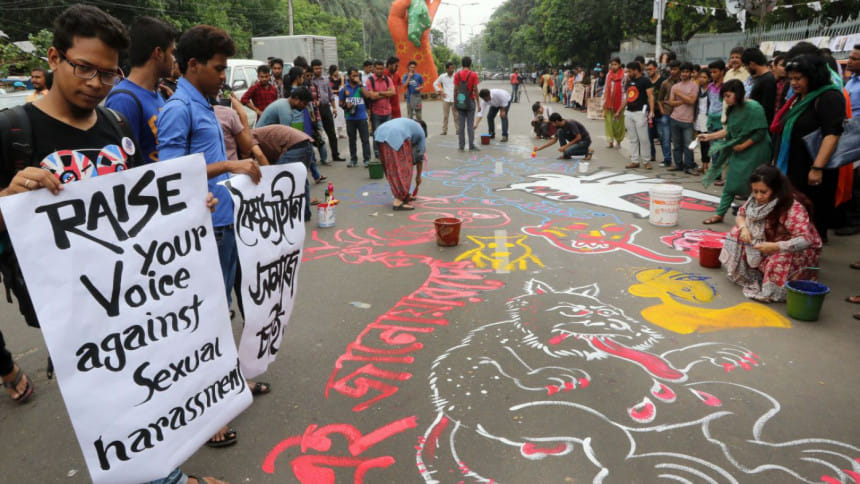The outrage and issues thereof

THERE is understandable outrage at the alleged sexual assault of at least 20 women by a large group of men during the Bengali New Year celebrations at the Dhaka University. A thorough enquiry should be able to ferret out the actual happenings and the culprits as also the failings of the authority.
Howsoever distressed we may be due to the above incident, we shall be less than honest if we do not admit that similar incidents did occur in yesteryears at the Bangla Academy premises and the Central Shaheed Minar. In the not too distant past we had witnessed the unbecoming behaviour of a large section of graduates of Dhaka University who set a disgraceful example by forcibly taking away convocation gift items in excess. The Vice-Chancellor of Dhaka University lamented at the painful and shameful acts of graduates who could stoop so low over trivial things.
The above incidents have been cited to drive home the point that over the years both civil and criminal infractions of the young adult have not been penalised in the desired manner and the moral authority of the guardians have perniciously gone on the slide. From another angle, the most remarkable fact of our public life is the absence of public response to the erosion of order in civil society. In fact, the near supine acceptance of many indignities and excesses inflicted upon citizens by the arrogant is a blight for which the entire privileged and well-off section of our society and all thinking people bear responsibility.
We may now look at the alleged laxity and inertia of the law enforcement authority. Upon scrutiny of the prima-facie facts it would indeed be difficult to disagree with the cynics who say that while police is sensitive towards signals sent by high-ups in respect of defending the elite, it would not be desirably prompt in responding to the distress calls of the other. One has to understand the alleged reality of selective law enforcement, perhaps caused by a deviant sub-culture. The situation undoubtedly demands remedial action.
For the present both Dhaka University and the police cannot shirk or shy away from their statutory responsibilities. The perpetrators and the suspected schemers have to be booked after due diligence and brought under the law. The defaulters in the enforcement outfit have to be punished at the earliest, notwithstanding the encumbrances of maintaining order in huge crowds. Incidentally, Dhaka University has to answer why volunteers in sufficient numbers were not engaged in such a demanding gathering as has been the practice, to complement and facilitate law enforcement in sensitive locations.
According to media reports on the incident, "Videos show that a particular group of young men led by a bearded man isolate approaching girls from others and then launch heinous sexual assault on them." Should not investigators detect something indicative in that?
It might be worthwhile to recollect that in the recent past the nation had witnessed the virulent movement of a certain quarter to restrict and contract the increasing entry of our womenfolk into public space. Looking back one would find that women's movement beyond the confines of the household and women's participation in public affairs has not been easy. Therefore, the suspected mischief to put the clock back needs to be seen in perspective in order to appreciate the potentials of damage that may be caused by obscurantist elements.
The investigators may have to see if the lurking misogyny in many dark hearts have fanned and prompted violent action in the Bengali New Year celebrations. The suspicion is that in a particular strand of education we may have a significant generation of men being inculcated with misogynist values.
Curiously enough, the slogan of the Islamic groups in Pakistan was 'Chaddar and Chardiwari' (the veil and the four walls) and the sanctity of the private domain was epitomised by this statement. The segregation of women from public life was seen as goals that would enhance the security of women as well as occupying the moral high ground. In Bangladesh there are quarters that pander to misogynist tendencies prevalent in society. Politically women are considered to be a soft target.
The test of any civilised society lays in the measures that it takes in guaranteeing the safety of its more vulnerable members, particularly the women. The National Liberation War of 1971 and women's liberation movement on the international stage had galvanized our women into emancipatory actions. There is a very long way to traverse.
The writer is a columnist of The Daily Star.

 For all latest news, follow The Daily Star's Google News channel.
For all latest news, follow The Daily Star's Google News channel. 



Comments